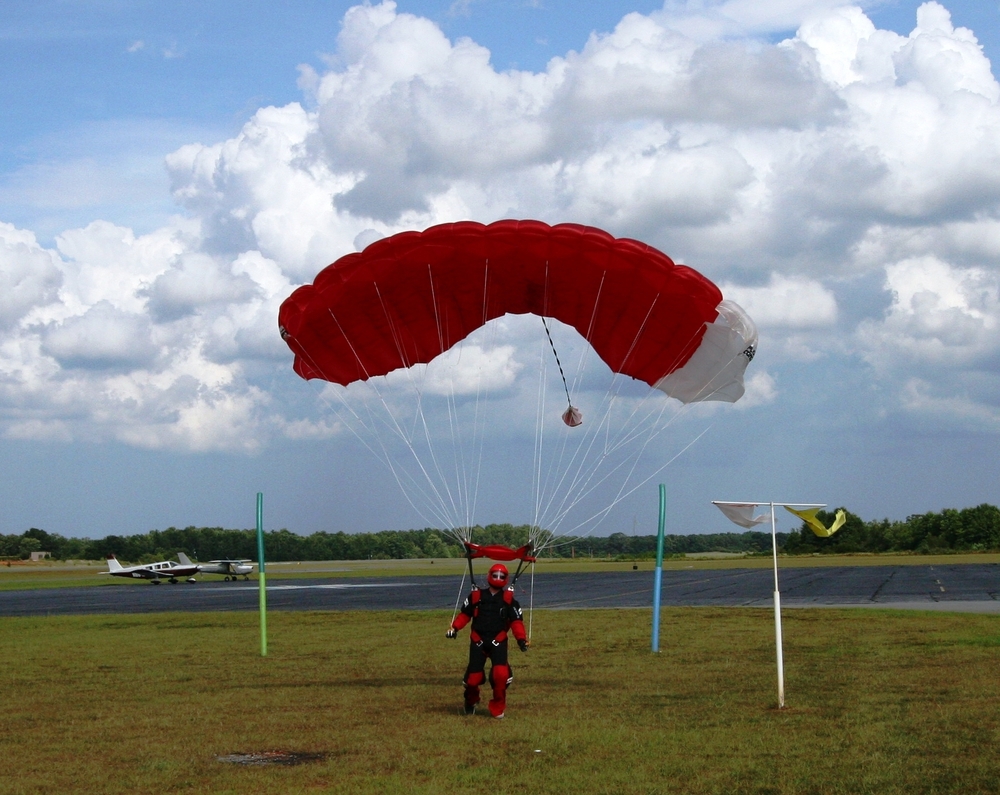nerd137 0
QuoteQuote
None of these comparisons do justice to the thing at hand, because as soon as one starts to compare an apple to an orange, or an apple to a different kind of apple, it loses meaning.
a dodge worthy of Speakers Corner.
Come on.
I totally agree with quack....however, I also feel that there is at least SOME value in comparing risks - even if it amounts to comparing apples to oranges.
voltage 0
QuoteNow that we are seeing cell phone use while in freefall I expect to see statistics change.
I can remember times when the real risk taking at the DZ started after the last load of the day (like riding the rotating beacon 150 ft AGL, doing motorcyles 130 MPH on the runway, etc.)...
cell phone use in freefall? Can you elaborate on that?
A friend of mine took his cell phone after he landed out 2 times and had to walk back one time (he is student too...). so I might consider that.
But in freefall? "YEEES HUN I WILL BE HOME SOOOOON"
QuoteQuoteQuote
None of these comparisons do justice to the thing at hand, because as soon as one starts to compare an apple to an orange, or an apple to a different kind of apple, it loses meaning.
a dodge worthy of Speakers Corner.
Come on.
I totally agree with quack....however, I also feel that there is at least SOME value in comparing risks - even if it amounts to comparing apples to oranges.
It's just not that hard. It's incredibly easy to compare in a misleading way, but it's not remotely impossible to do it in a meaningful way.
nerd137 0
QuoteQuoteNow that we are seeing cell phone use while in freefall I expect to see statistics change.
I can remember times when the real risk taking at the DZ started after the last load of the day (like riding the rotating beacon 150 ft AGL, doing motorcyles 130 MPH on the runway, etc.)...
cell phone use in freefall? Can you elaborate on that?
A friend of mine took his cell phone after he landed out 2 times and had to walk back one time (he is student too...). so I might consider that.
But in freefall? "YEEES HUN I WILL BE HOME SOOOOON"
The ONE time I took my cell phone with me on a jump, I put it in a pocket directly beneath my chest strap and I had a wickedly hard opening which jammed my phone into my ribs. My ribs hurt for like 6 weeks after. Doh!
fastphil 0
QuoteQuoteNow that we are seeing cell phone use while in freefall I expect to see statistics change.
I can remember times when the real risk taking at the DZ started after the last load of the day (like riding the rotating beacon 150 ft AGL, doing motorcyles 130 MPH on the runway, etc.)...
cell phone use in freefall? Can you elaborate on that?
A friend of mine took his cell phone after he landed out 2 times and had to walk back one time (he is student too...). so I might consider that.
But in freefall? "YEEES HUN I WILL BE HOME SOOOOON"
The "Freefall Cellphone" has been on a TV commercial lately. Of course, I cannot condone that kind of waste of freefall time, although it gives "being put on hold" a whole new meaning)...
Twelve died at Z’hills during my time there and I agonized over each of them. The first was Slick Armstrong, a talented California relative worker, who had come out for the first Turkey Meet in 1969. About two o’clock in the morning, he and a buddy found someone to take them up for a low pull contest. Slick won, the Feds pulled the pilot’s ticket, and I saw my first crater. However much I understood that the danger was the attraction (would we even do it if there were absolutely no risk?), I could never rationalize people dying doing something that I loved so much. Thousand of skydivers visited Z’hills, and by the time I sold it in 1984, I already knew over 160 people, either in the States or overseas, who died after exit, and maybe another 40 to 50 killed when the jump ship crashed. Sobering figures.
As Roger Clark already noted in this thread, one of my favorite, confidence-inspiring lines at the beginning of a first-jump course was that they'd already done the most dangerous part of making a skydive, which was the drive to the airport. The irony is that I'd never known anyone killed in a car crash, and everyone I knew drove a car. Not everyone I knew was a skydiver.
So to all those whom I threatened with a grounding, I trust you’ll cut me a little retrospective slack, along with every other DZO past and present.
Hoop
SCR242, SCS90, NSCR26
It's been nice knowing all you guys and gals.
Quote
So to all those whom I threatened with a grounding, I trust you’ll cut me a little retrospective slack, along with every other DZO past and present.
Hoop
SCR242, SCS90, NSCR26
Hoop, I hope that slack goes both ways bro, for those of us that had a few indiscretions back in the day. Glad to see you're still kicking.
Rick Whitlock, Falling Arches '76 -' 78 "Banned for life"
QuoteRick Whitlock, Falling Arches '76 -' 78
Were you the one designated to hold Arch stable
-----------------------
Roger "Ramjet" Clark
FB# 271, SCR 3245, SCS 1519
QuoteI ride a 700hp motorcycle over 10k per year.
which bike is that?
I almost proved the statistics at 98,000 miles, but fortunately my skydiving helped me fall better. (possibly true - no video to verify)
502ci big block chevy motor.
Custom headers, Custom air intake, polished cylinder heads and 150hp shot of NOS.
Or is that tire smoke?
stayhigh 2
nicron 0
QuoteOk, I'll look for him. But if you talk to him first...
I was the rigger at Z-Hills for two years 73,74 and jumped there and Deland quite a bit. Part of 74 and early 75 I moved to Miami and built the first 100 or so Wonderhogs for Bill Booth and jumped at the Glider Port mostly (Z-Hills too). 75 into 76 moved to Aurora Ill. to build rigs for Bill Buchmann. Jumped at Hinkley with side trips to Sturgis MI, and the Richmond Boogie. 76 to 80, Z-Hills, Deland, the Sod Farm in Tampa. Have also jumped at Downsville MD. and was in the first 8 man at Woodbine MD.
Pass that on and see if we crossed paths somewhere. His name does sound familier, but 30 years is a real blender when it comes to names...
Talked to my dad this weekend, turns out he remembers you from Z-hills. Says he bought a rig from you back in the day! So there ya go... small world, eh?
QuoteQuoteOk, I'll look for him. But if you talk to him first...
I was the rigger at Z-Hills for two years 73,74 and jumped there and Deland quite a bit. Part of 74 and early 75 I moved to Miami and built the first 100 or so Wonderhogs for Bill Booth and jumped at the Glider Port mostly (Z-Hills too). 75 into 76 moved to Aurora Ill. to build rigs for Bill Buchmann. Jumped at Hinkley with side trips to Sturgis MI, and the Richmond Boogie. 76 to 80, Z-Hills, Deland, the Sod Farm in Tampa. Have also jumped at Downsville MD. and was in the first 8 man at Woodbine MD.
Pass that on and see if we crossed paths somewhere. His name does sound familier, but 30 years is a real blender when it comes to names...
Talked to my dad this weekend, turns out he remembers you from Z-hills. Says he bought a rig from you back in the day! So there ya go... small world, eh?
Fantastic! Say hi for me please.
I bet he'd have some input to this thread...
-----------------------
Roger "Ramjet" Clark
FB# 271, SCR 3245, SCS 1519
QuoteAs Roger Clark already noted in this thread, one of my favorite, confidence-inspiring lines at the beginning of a first-jump course was that they'd already done the most dangerous part of making a skydive, which was the drive to the airport.
Hey Hoop,
I wonder if that statement was more true in the old days of direct bag deployed T-10s like I learned on at Z-Hills. In all the time I packed there and hung out, I never saw even a malfunction on one. What do you think?
Seems like the bad stats started after static line at least in those days...
-----------------------
Roger "Ramjet" Clark
FB# 271, SCR 3245, SCS 1519
bert_man 0
Quotetake 10 years at 200 jumps per year, and suddenly it's 1 in 50.
In that case, then (if I'm correct, and if we didn't age) you would have a 50% chance of still being alive for your 250th anniversary of skydiving. The way I see it, there are a whoooooole lot of other things that probably can/will kill me before my 250th birthday (outside of the normal aging process)
Just something to consider.
Also, when I started jumping, I did my own research just for shits and giggles, but through a different avenue. I found a list produced by some branch of the government (i forget which) that listed the likelihood of dying of various things (fire, car wreck, drug overdose, falling off of a high place like a ladder) per year. There was an overall statistic of 'likelihood to die an accidental death [per year]' and I compared this to the "odds" of dying after a year of jumping. I ended up concluding that making 150-200 jumps per year effectively doubled your chances of accidental death. (sorry i dont have the data i used, and may not remember it that accurately...)
Of course it doesnt factor in attitude, judgement, risk tolerance, blindfolded HP landings, etc
"The reason death cannot frighten me, is because life has cured me of fear."
Web Design
Cleveland Skydiving
"I understand you are unable to work as a Volkswagen mechanic or as a professional wrestler due to your injuries," the nasty lawyer said.
"Yeah." Pitifully.
"And that your wife has also filed a suit for 'lack of consortium'."
"Yeah." Groan.
"And that you are receiving social security benefits as the result of your injuries, which prevent you from working."
"Yeah."
"Hmmmm." Pause as the lawyer looks through a stack of 8X10 glossies. Then - "Do you understand that fraudulently claiming social security benefits is a federal offense?"
"Uh, well, ah, no."
"Tell me," says the lawyer, slapping down a long-distance photo of our crippled first jump student, "is that you lifting the engine out of the back of a VW Beetle last Monday?" And without waiting for a reply, slaps down another. "And is this a photo of you chasing our photographer with a very large crowbar?"
Case dismissed. But the insurance company still paid out, I think, 20K.
Hoop








One of the principles of risk assessment is that a single number cannot be used to satisfactorily characterize a risk, nor to set one risk as being higher than another. As one author has stated, "no numerical rating of risks can be strictly objective, because individual ratings are influenced by inherently subjective values" (Thomas and Hrudey, 1997).
So, even with all of the statistics being thrown about, it ends up being a comparison based on individual experiences, perceptions, etc.
Interesting discussion, though.
I found a few books on risk assessment a while back...I think they'll be interesting to read...once I get around to them.